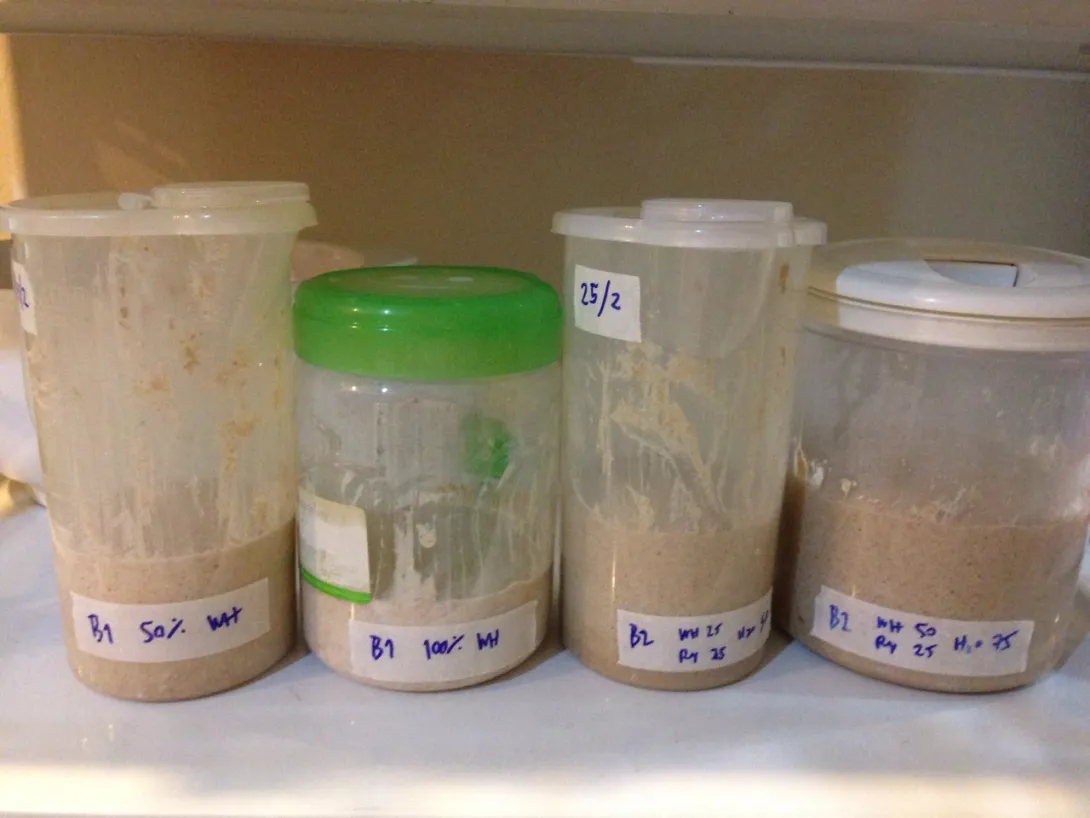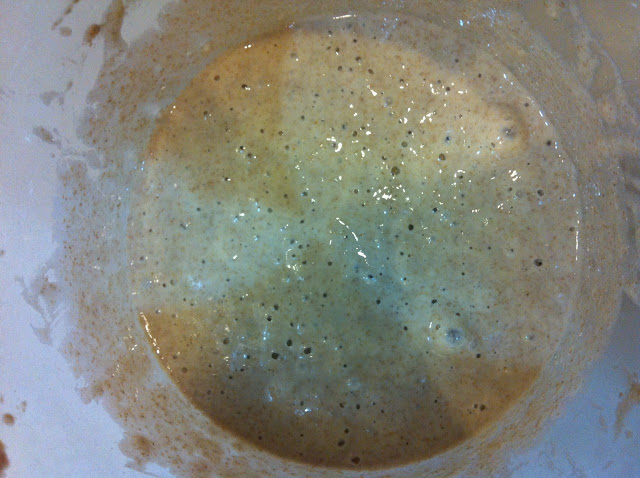
Hi All,
I'm from Thailand, my English isn't good , maybe confuse you guys (someone said I had broken English), but hope you can understand.
I started whole wheat starter last Wed (24/2) and rye starter on last Thu (25/2).
I fed them regularly until it could rise and double. Then I gradually switched to white flour, until it reached 100% white flour.
Now, the rye starters on 3rd and 4th containers can rise, double to peak, and fall back. This morning, I tested dropping them in water, only 4th container can float.

Here, it's closer look


The whole wheat starters on 1st and 2nd containers have many tiny bubbles as picture below. But none of them can float in water.


I've found that after feeding, rye starter can double itself about 2 hours, rise and fall down. Whole wheat starter can double itself slower about 4 hours.
Last night, since I noticed rye starter can double itself, in stead tossing half, I mixed no knead whole wheat bread , left it overnight at room temperature. This morning, I baked , it tasted very very sour that I couldn't eat.
Again, I wonder if my whole wheat starter worked, I used 1 tablespoon mixed with 100 cc water, 100 g. white flour and little salt to make small dough. The bread tasted a bit sour, but not as much as no knead whole wheat bread.
Anyway, both breads taste not good for me. I think the starters aren't matured enough. So .. my questions are :
What should I do with rye starter, since it can rise, double, and fall down? How many days should I feed them regularly before I can make bread? How to reduce sourness? I read from this link http://www.sourdoughlibrary.org/less-sour-sourdough/ , I plan to reduce hydration % on feeding, is it good? Room temperature is quite hot , today is about 90F. Should I feed them 3 times a day?
I must go out and will come back with more questions tomorrow. Thank you very much in advance.
But do bear in-mind that there are dozens of ways to maintain starters but keeping them in the fridge has worked for me for a few years now.
When I make bread, I either use the starters directly from the fridge, or I take some from the fridge and use that to make a bigger starter which I use to bake with. (Then always top-up the "mother" in the fridge). My wheat and spelt starters are maintained at 100% hydration, then rye at 150% When not making bread the starters live in the fridge un-touched until the next time. Currently only making Rye once a week, but the others are used daily or every other day.
My loaves are mildly sour, and always seem to rise well.
There is information online about temperature and yeast and bacteria growth rates too - e.g.
http://hans.fugal.net/blog/2006/07/03/sourdough-critter-growth-rates/
so at 32C (90F) you're well into the acid producing zone - hence the more sour taste to your breads. Can you keep the fermenting/proving dough a little cooler? My breads almost always go through the bulk fermentation stage overnight (9-10 hours) but my kitchen is at about 21C.
-Gordon
Gordon, thanks for the link about bacteria growing faster in higher temp. Here in summer, temp may be very high like 35-38C. Then I should try several way to ferment and prove dough to be less sour.
This evening I come back and test water floating on whole wheat starter, now it can float. So I think I should make last feed before puting them in fridge, because they smell very sour. Adding more water & flour maybe can reduce the sour taste.
After feeding, I also taste them raw, the whole wheat starter tastes mild sour like natural yogurt. But rye starter is more sour, but not too sour like my testing bread this morning.
use it. When a just fed starter starts rising, about 1/3rd risen, cover and place into the refrigerator to slow down fermentation. They will still rise but much slower and you won't have to feed them so much. Depending on the amount of flour fed and the temp in the refrigerator, they will take 3 to 10 days before you have to feed or use them for a recipe. So keep putting the dates on them. Letting starters and dough over ferment at hot room temperatures is making the dough sour. So starters need to be fed often. Dough will ferment quickly.
Putting starters into the refrigerator should help reduce the sourness, and give you more control. Try it. You don't want to reduce sourness in starters completely. What you do want to do is keep the sourness low in bread doughs and that can be done separately each time you set up for a bake. If you don't have refrigeration, please say something, we can then try salting the starters to slow activity.
Consider the time it takes to make the starter rise, peak and fall. A dough will behave similarly. But you want to bake the bread dough before it reaches peak activity. You can build the starter is several steps and thicken up the starter so it is more like a dough. A "no knead" recipe ferments long with just a little amount of starter and high hydration, this makes for a sour tasting bread.
Look into a sourdough recipe that builds the starter in several steps with more equal amounts of starter to flour and has a short rising time (within a few hours) after mixing the final dough. This should help you find a recipe that is not too sour. Try to raise the dough in a cool place. You can mix the dough with ice water to slow down fermentation if needed. Storing the flour in the refrigerator will also help. Then when you want to raise the loaf quickly, bring the dough to room temperature.
longer fermentation, more sour tasting.
But I have to wait until dough are double in size , that maybe long, then it will be more sour.
Adding more starter to recipe maybe good option.
To use starter from fridge, what should I do? If the recipe use 100g. starter, how to manage the amount and time? Because, it's very hot here, if I take some out , feed, leave in room temp , it may be very sour again.
I started doing it more or less by accident and it seemed to work fine for me, so I keep on doing it.
I typically will use 40% bakery percentage of starter, so a typical recipe might be
800g flour (200g stoneground wholemeal and 600g white), 320g starter, 420g water, 12g salt. So take 320g out of the jar in the fridge, top it up with 160g white + 160g water and back into the fridge it goes. Mix all those up, leave 20 miuntes, light knead, then leave covered overnight (9-10 hours) that's in my kitchen which is at approx. 21C. Then in the morning, I'll divide that into 2 or 3, shape and leave to prove for 2 hours if possible, then into the oven. (Very hot, >250C for 12 minutes with steam, then down to 210C for another 20-25).
I keep about 500g of starter in the jars.
If I needed more - e.g. for tomorrows bread, I'm making 2 large and 6 small loaves, I needed 1020g of starter, I took 210g out of the jar, topped the jar up with 105g flour + 105g water, then into the bowl with the mother, I added 420g flour and 420g water and it's currently sitting in the warm cupboard (at about 24C) for 5-6 hours in total. by about 9pm tonight it'll be bubbly and I'll use that in the mix.
I think that because of your relatively high temperature, you won't be able to do an overnight ferment, so it will happen quicker - in which case I'd do the same as above but really try to keep it as cool as possible (without putting the dough in the fridge) You may have to keep checking it - possibly even every half hour after (say) the first couple of hours. You could do a fold & turn if you like too - I don't (as I'm asleep!) and I don't chase particularly high hydration/big bubble doughs though.
My Rye starter always smells more vinegary than the wheat ones but I think that's just how Rye is.
-Gordon
Thank you very much to Gordon and Mini Oven.
This morning, I tried both starter.
I put 50 g. starter + 50 g flour + little salt + Water ( I don't weight, just mixing and feeling the dough).
Rye starter, it use it directly from fridge, about 1 1/2 hour for bulk fermentation in room temp. I kept watching them and tested it with indentation like this picture.
For proofing, it's about 1 hour (indentation test again), then I baked. Here, how it looks (forget to take picture, before cutting)
It isn't sour at all, so next time I should use less starter.
BUT .... another bread, I used whole wheat starter (same recipes 50 g. starter + 50 g. flour + little salt + water). I took starter out of fridge, I didn't see any rising since last night before I put it in fridge. So I left it at room temp for a while , until I saw rising sign.
After kneading, I did stretch & fold 3 times before fermentation, then shaped and proved. But I had to go out about half and hour and I was afraid, dough 'd be over proof. So I put it in fridge. About half hour, I came back home and took it out, wait until it was ready to bake (about 1 1/2 hour).
Wow .. it tasted good, mildly sour. Here it's picture :
I'm quite happy with the results. Really thank you for very valuable advice from both of you.
Now you have some basic ideas of how to manage it all in your heat, so you can make little changes at a time to see how you can improve it, or make it work/fit in better to your routine.
-Gordon
well done!
That's the way to use your refrigerator! :) Very, very happy bread thoughts and aromas!
Big Thanks :)